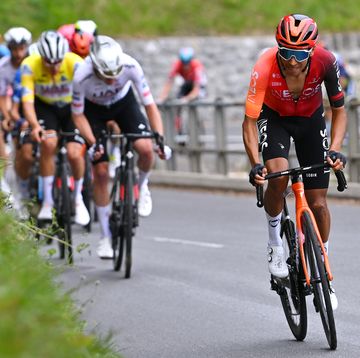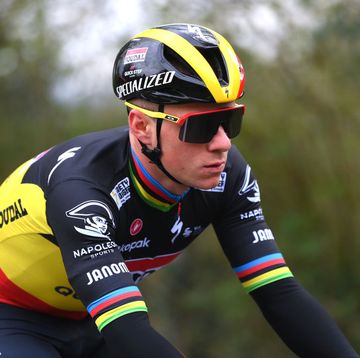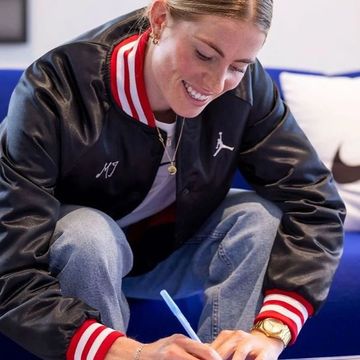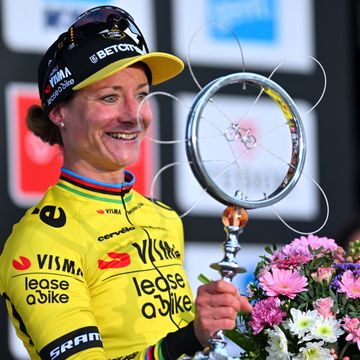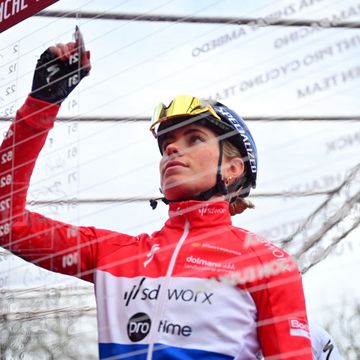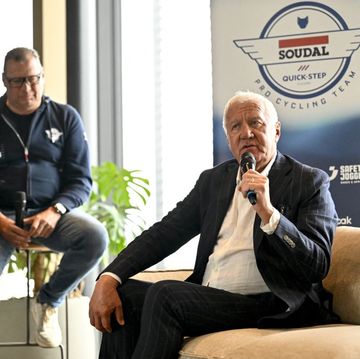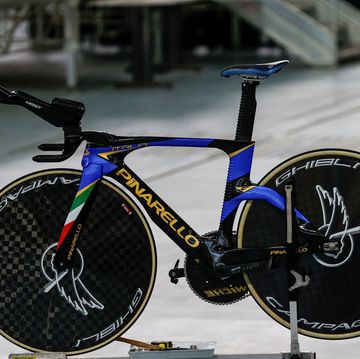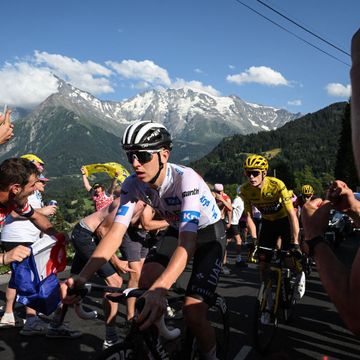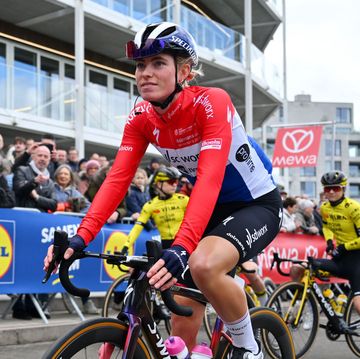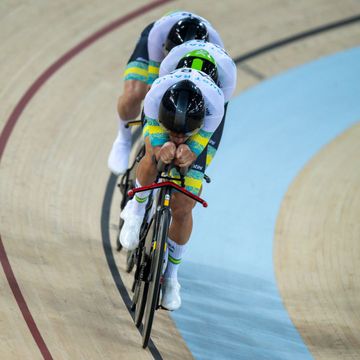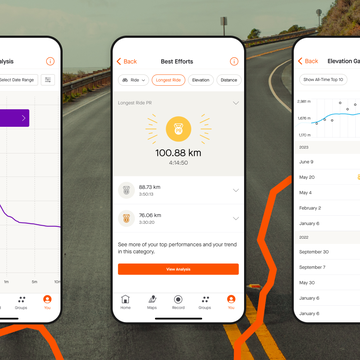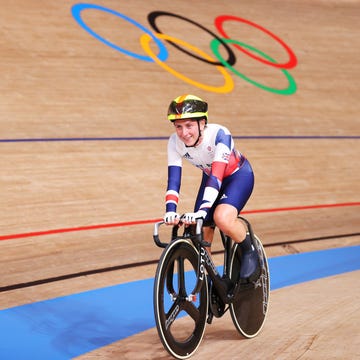So before I got divorced, I loaded a bike and a suitcase and a laptop into my pickup, said goodbye to my wife and children, and drove away from my home in southern Illinois to meet Greg LeMond.
I was going down to the Tour de Georgia to find him, and the date I ended up arriving there, April 20, 2006, was exactly 19 years after LeMond's brother-in-law accidentally shot him while they were turkey hunting in California. LeMond had won his first Tour de France the previous summer, but in 1987 had been having a bad spring; after breaking his wrist in a minor race in Belgium, he'd come back to the States to heal and decided that as long as he had some free time, he might as well have some fun—then he lost 70 percent of his blood volume and nearly died.
He recovered, of course, and two years later pulled off the first great comeback in American cycling history, the one not much of anyone seems to care about these days: He won the 1989 Tour de France on the last stage, improbably erasing a 50-second deficit to the great French racer Laurent Fignon in just a 25-kilometer time trial, taking the yellow jersey by eight seconds, which was the narrowest Tour victory ever and, meantime, setting a record for fastest time trial in Tour history. And as if this weren't enough, LeMond won the 1989 world champion road title a few weeks after that.
For anyone much under the age of 40, or people older than that who didn't get into the sport until Lance Armstrong's own miraculous comeback in 1999, it can be difficult to understand—and believe—how popular LeMond was, how significant his victories felt, how deeply he touched lives.
His early career promised greatness: In 1979, he became the first American to win the junior World Road Race Championship, then four years later, he won pro Worlds—again the first time for an American—by attacking and holding off the pack through the last 11 kilometers. The next year, 1984, he rode his first Tour de France and won the white jersey, for best young rider.
It was the 1985 Tour that began to establish him as a legend: His teammate Bernard Hinault had already won four Tours and, nearing the end of his career, wanted a fifth to equal the record that at the time was shared only by Jacques Anquetil and Eddy Merckx. LeMond was obviously stronger but, under pressure from his team, agreed to support Hinault rather than take his first victory; in return, Hinault promised to help LeMond take the yellow jersey the next year. But The Badger repeatedly attacked LeMond in 1986 so that his win—another first for an American—was achieved not only with little support from his team but in the face of what many fans believe was outright hostility. It was a cowboy win, reckless and individualistic and raging against the establishment, and because the race had also appeared at length on U.S. television, American cyclists responded: When LeMond had turned pro, in 1981, there were about 10,000 licensed road racers in the United States; at the peak of his popularity, no more than 10 years later, there were around 40,000.
After his comeback in 1989, LeMond's celebrity reached heights no one thought a possible for a cyclist: He made the cover of Sports Illustrated, was named the magazine's Sportsman of the Year (first time for a cyclist), visited the White House, did a guest spot on Johnny Carson, appeared on the Wheaties box as well as on a promotional giveaway stuffed inside Chex cereal boxes, and was the star of a $12-million Taco Bell ad campaign that featured TV commercials and the giveaway of 300,000 water bottles carrying his signature. He was not merely a star. He was an icon.
As much as we Americans loved him, the French loved him maybe even more, even though he'd taken a Tour away from a French rider. For a time after his comeback he was the most popular athlete in all of France, according to a couple polls. I think they loved LeMond so much because he was a calamity, the kind of person for whom everything seemed to be going wrong at all times. Yet somehow, with a sort of cheerfully honest determination, he could still succeed—for instance, on the final, ceremonial stage into Paris for his first Tour win in '86, LeMond crashed three times. He had panache, in the classic French Cyrano de Bergerac sense: noble, reckless, faulted in an endearing and particularly human way. Get knocked down, get up, keep going and somehow find exuberance and joy throughout the experience.
Maybe panache is one thing in a great champion like Greg LeMond and quite another thing in an ordinary person like me, but I have always wanted to exhibit that quality in my bearing, in my endeavors, my way of life, to be someone you can laugh with and laugh at, who knows life is serious but regards it with humor, who always has something going wrong but finds a way to make it right.
The trouble with things forever going wrong, of course, is that eventually something will go wrong that can't be made right. Eventually, there will be no cheerful rallying back.
Greg LeMond was at the Tour de Georgia, and a bunch of us journalists were getting to meet him because he was supposed to be in another process of cheerfully rallying back.
The Trek Bicycle Corporation, which produced LeMond's eponymous brand of bicycles, was unveiling his new line of carbon-fiber race bikes. Trek should have had a great business partnership on its hands: It also made the bikes Armstrong had ridden to all seven of his Tour victories, and the combined star power of the two greatest American champions was the kind of thing marketing and PR teams dream about.
But LeMond had been publicly feuding with Armstrong and generally speaking out about doping. The American public, the bicycle-buying public, had not been amused by his remarks. Trek would later say, as part of a lawsuit between the company and LeMond, that it had received complaints and that the controversy was hurting sales.
LeMond's most notorious remark: "If Lance is clean, it is the greatest comeback in the history of sports. If he isn't, it would be the greatest fraud." His funniest: With the drugs they have these days, "one could convert a mule into a stallion." Or I thought it was funny at the time he said it. Not many people seemed to have agreed with me. A lot of cyclists I'd meet thought LeMond was jealous of Armstrong.
This was just the latest calamity that, sure, in a way may have been central to LeMond's appeal but had also kept him from achieving the kind of superstardom that Armstrong had forged out of his comeback. From the 1990 marketing fiasco, when Taco Bell had to recall all those promotional water bottles after one of the mouthpieces came off and a child nearly swallowed it, to the decade-long floundering of his bike brand before Trek got involved, to his partial ownership of Bruegger's Bagels, LeMond had always seemed to be chipping away at his own legacy: We don't want our heroes to sell us breakfast; we want them to sell us hope. Lately, his brand had been rumored by industry and media sources to be in trouble. I guess the idea in April 2006 was that if the media met LeMond and found out he was an okay guy we would be more inclined to write good things about his bikes and people would be more inclined to buy them.
We met LeMond in the German-themed town of Helen: a place where all the buildings look like they're in Berchtesgaden and the locals talk with that pleasant twang folks have in the mountains of the Southeast. In a couple of days, the Tour de Georgia would pass through Helen on its way to Brasstown Bald, where on the murderous 20 percent pitch to the summit Tom Danielson would do his best to put time into Floyd Landis but it couldn't be done, not this year. Floyd was unbeatable this year. A mule was going to win the Tour de France.
We stayed in a very nice, very quaint hotel called the Helendorf, behind which flowed the lazy waters of the Chattahoochee, and on the morning of April 21 we were assembled near the river in the early morning, sipping coffee and making journalistic small talk. A shaft of light poked through the trees. And Greg LeMond appeared in it.
He announced himself as if nobody knew who he was. "Hello, I'm Greg LeMond."
It was him all right. But not the 5-percent body fat, boyish-blond Greg LeMond in all those classic bike-racing photographs guys like me once had taped on our walls. He had the smile, the joyful demeanor, the classically piercing blue eyes, but this was a gray-haired, burly fellow who looked more like a retired NFL running back than a Tour de France champion. He was also the happiest, most folksy person you'd ever met in your life. He looked at the journalists one by one, at the Helendorf and the river and the shaft of sunlight, and he said the obvious: "Isn't this a great place?"
He said, "I'm so happy we're here."
The Trek people ushered us inside the building, into a conference room where we listened to a presentation about the new bikes, which looked magnificent to me—but then, most bikes do. LeMond stood near a new bike that was nicely displayed on a little riser, and he began his remarks by saying, "I used to be a bike racer."
None of the journalists laughed or looked surprised. To me, this would be like meeting Bill Clinton and having him say, "I used to be president of the United States."
LeMond had intended the irony, and had hoped for a laugh and seemed momentarily shaken by the lack of response. He said a few more inconsequential words, giving off an uncharacteristic nervous impression, as if he wanted to do the right thing for Trek and not say anything that could lead anywhere dangerous, but for him to rein in some small part of himself by necessity he had to rein in all of himself. He handed over the floor to one of the Trek people who began explaining the intricacies of the new bikes.
I didn't listen. I couldn't. Greg LeMond was in the room, sitting not 20 feet from me, and I could tell he wasn't listening to the presentation, either. He was peering into his hands and picking at his fingernails and poring over in his mind things I couldn't even guess what they were. He is 22 months older than me, and even though I didn't know him then, I always felt like I had, and had always admired him, and his presence in my life had been as significant as anybody I'd ever known. I had never been a great cyclist but had always considered cycling to be one of the centers of my life, and there is no doubt that when I bought my first fancy road bike in early August 1986, when I changed from that person who tooled around on a bike for no reason to a person who dreamed of riding too far and too hard, I did so because Greg LeMond had won the Tour de France the month before. I remember at the time seeing the pictures of Greg in the newspaper and in Sports Illustrated, that grinning, almost astonished look he had on his face. When he was pictured off the bike, he seemed always to have one of his hands to the top of his head, as if saying, without words, "My God, can you believe this is happening to me?" I remember thinking, what a humble guy, an ordinary person achieving extraordinary things.
Whenever I had ridden a bicycle, I had said to myself, "My God, can you believe this is happening to me?"
It would come to pass, in the process of trying to write a story about LeMond, that I would interview him for a couple of hours during the days in Georgia and, a few months later, for another couple of hours at his house in the suburbs of Minneapolis. I recorded all this with an old microcassette recorder, on a number of little tapes that I carry with me in my briefcase to this day. On those tapes LeMond is exactly like the person I imagined I had known my whole life: funny, smart, completely without ego, totally self-deprecating and honest to a fault. When I was in the presence of Greg LeMond, I couldn't help thinking, yes, this man is my friend.
I also read every document I could find on the subject of Greg LeMond and watched every LeMond clip on YouTube, both in English and French, and in the process I transformed myself into a walking encyclopedia on all things Greg LeMond.
In my career as a writer and in my life as a cycling enthusiast, meeting and hanging out with Greg LeMond topped the list of things I had been able to do, and because, like Greg LeMond, I am not the type of person to keep my mouth shut, I told everybody I knew the great story of how I met Greg LeMond and what a fantastic person the guy is, how funny, how genuine, what a regular guy. I told people how I had come to learn, through meeting Greg LeMond, that truly great people have nothing to prove and can therefore be some of the friendliest, most humble people in the world.
When all my friends and colleagues and fellow cyclists who loved Armstrong would defend their own hero, I would say, "I don't know Lance Armstrong and what he's all about, but I've met Greg LeMond, and all that talk about Greg being crazy or angry or jealous of Lance, that's a bunch of crap. Greg is totally cool."
I never wrote the story.
In fact, after I drove away from LeMond's house in 2006, I hardly wrote a word for the next two years and lost interest in cycling and essentially fell apart in almost every way a grown man can fall apart. I would say it's a miracle that I am alive and even more a miracle that I once again sling my leg over the top tube of my bicycle and take it out for a ride nearly every day of the week.
Once in a while, during those two years, friends of mine would ask, "You still writing?"
I would lie. "I've got six projects going," I'd say. "I love writing."
Or people would look at me, at a certain puffiness you don't see in cyclists who ride 25 hours a week the way I once had. "You still riding your bike?" they'd say.
"Here and there," I'd lie, "but not like I used to."
Sometimes people would say to me, "Whatever happened to Greg LeMond?"
I would stare at my shoes and say, with complete honesty, "I don't know."
I still don't know. The last time I saw him was at his house, on July 26, 2006, several hours before the story broke that Floyd Landis had tested positive for testosterone doping after his miraculous comeback in Stage 17 of the Tour de France. LeMond was happy about the Tour and thought it had been raced cleanly, something that mattered a great deal to him. We talked for a couple of hours, then he walked me to my truck, which was parked at the end of his driveway. The skies were as clear blue as LeMond's eyes. We shook hands, and I drove away. Within an hour, I was in downtown Minneapolis having coffee with my mistress. She was smoking a cigarette and was not happy with me for having taken so long talking with Greg LeMond, whose name she didn't recognize. The next day, while I was driving from Minneapolis back to southern Illinois, a 12-hour drive over not-very-scenic interstate, I heard on the radio that Floyd had been caught, and I said to my mistress, "This is going to be a calamity. Greg will definitely speak up about this."
She didn't care. She changed the radio to a station that played pop music and said, "Is that all you think about is bikes?"
LeMond wins U.S. stage race Tour DuPont. (Getty Images)
It was—though right about then that was starting to not be true anymore. For years I had more or less done nothing with my life but ride my bicycles or work on my bicycles or read books about riding or books about working on bicycles, and I certainly had gotten much out of the lifestyle, the kind of benefits any cyclist knows so well. Then for reasons that I can only begin to approach by saying I had lost my mind, I had betrayed my wife and taken up with a mistress who was overweight, smoked heavily, was in her mid-20s, considerably younger than me, and had been a student in a class I'd taught the previous spring. I liked her, I guess, but I could never pinpoint why. She seemed like the person I was before I took up cycling but wasn't uptight about her weight or how much she smoked. Maybe I admired that about her.
I can't remember. Anyway, it wouldn't matter. A week from the day I drove away from Greg LeMond's home, I would meet another mistress, this one a person my age who didn't smoke and who loved bicycles as much as I did, and I fell in love with her as with no other woman I'd ever met. The smoker found out that I had taken up with the cyclist—I told her, actually—and we got into a huge argument and she went to my wife and told her what had been going on, then went to the university and told them what had been going on, and as you might imagine, I got kicked out of my house and came within a couple of millimeters of losing my job and ended up living with nothing, sleeping on the floor in a rented room and only seeing my children every other weekend. I lost the cyclist, the one I loved, as well. She lived halfway across the country from me and didn't know the extent of the collapse I had been going through. I didn't have the guts to tell her, so I just let it go and stepped away from my bike and checked out of the world.
The day I sat in the conference room at the Helendorf Hotel with the journalists and Greg LeMond and the Trek representatives, I wish I could have known what was going to happen to me and done something to stop it. Or maybe I knew somehow what was on the road ahead and just hoped, when it was all over, that I would land miraculously back on my feet.
On July 26, 2006, the day I was sitting in Greg LeMond's house in the suburbs of Minneapolis, in his study, a warm room with books on the shelves, some nice leather furniture, a couple of trophies, which I didn't bother to ask about because they didn't seem to be a big deal to Greg, he was asking me about my life, my career, not because he was kissing my ass to come off like a swell guy in a magazine but because he is a swell guy, a regular guy. Outside the window to the study, the spacious green manicured lawn of his estate looked perfectly elegant in the July-afternoon sunshine. He seemed a little edgy, though. His son Geoffrey was scheduled to come home from France later in the day, and the thought of the flight, the travel, the connections and so forth, concerned LeMond. Apparently, Geoffrey had ridden L'Etape du Tour, the event that lets amateurs ride a stage of that year's Tour de France, and had a great time, and after that, he'd gone to stay with some friends of the family. Greg himself was thinking about going along with him the next year and riding L'Etape. It struck me that Greg wouldn't really be going there because he wanted to ride; he wanted to be near his son. He paused somewhere in there, when he had been talking about his son—maybe he was thinking about what it would mean to return to France at the time of the Tour; maybe he was thinking about things a writer like me had no right to know—and became more serious than I'd seen him.
He remained oddly quiet.
For a second, I wanted to tell him how fucked up my life had become. I wanted to say, "Man, I'm cheating on my wife, and I brought my mistress with me on the trip here to the Twin Cities. She's in downtown Minneapolis right now, smoking cigarettes, hoping I keep it snappy during my interview with you." I felt like crying and asking him for advice. Surely Greg LeMond would know what to do?
But I kept my business a secret. He had secrets, too, I suppose.
Neither of us could have known right then that Landis had tested positive for testosterone, and that this would eventually lead to LeMond appearing in a California courtroom and admitting he had been sexually abused when he was a child. We had no way of knowing that on this very hour we were talking, somewhere in France professional cycling was teetering on knife edge over the very issue that had made this great champion, this terrific man, into a controversial, unpopular figure in his own country, not because of what he had done but because of what he had said.
Instead, Greg was running his hand through his hair and saying how Landis had raced clean, and the proof was, look, he got tired and had a bad day in the mountains then came back and had a good day. "That," LeMond said, "is what happens when riders race clean." He also said what a great person Landis was and how well the French would receive him and how, just a couple of months ago, he had met Floyd's father and really thought Floyd's father was a fine person.
He fell silent again. I got the feeling I shouldn't be looking at him. Somebody was moving around outside the window: a gardener fiddling with an extension cord. People were talking in other parts of the house. Maybe LeMond was listening to see if his son had come home.
I could remember the day LeMond met Floyd's father, because I was there. Geoffrey LeMond was there too.
On the day of the Brasstown Bald finish, the Tour de Georgia held a VIP party at the summit of the climb, in a park-service interpretive center. LeMond was one of the VIPs. Earlier in the day, in a driving rainstorm, he had stepped up to the bandstand at the start of the stage and fired the starter's pistol. This took place in a parking lot of a school, and the rain was falling so hard that no crowd had assembled; nobody seemed to be there but journalists and bike racers. When the emcee announced LeMond's name, the racers at the line hardly looked up. Rain pelted their helmets; they stared at their handlebars; this was going to be a miserable day in the saddle. LeMond fired the gun, the riders rode off, and within two minutes, the rain quit. Just as suddenly, when LeMond stepped down off the starter's stage, he was surrounded by cycling fans. Where they came from, I couldn't guess, and he shook their hands and signed autographs, all the time looking around nervously for Geoffrey's whereabouts. Geoffrey was in the Waffle House hospitality tent drinking coffee. Geoffrey was 21 years old at the time, a bit taller than his dad, and very skinny, and considerably more shy, or at least in this context he seemed to be. Geoffrey looked like he might be a quiet aspiring poet in a coffee shop; Greg looked the wisecracking guy in charge of the paint department at Ace TrueValue.
An hour later, I was in the backseat of a car with LeMond, on the way to Brasstown Bald. Geoffrey was in the front seat with one of the guys from Trek. We were laughing and joking and talking about what great cycling roads we were driving on. As we got closer to the mountain, we could see that crowds had gathered; cars were parked everywhere on the roadside, and people riding bicycles were everywhere. This was a huge crowd, though overall apparently the race was drawing about half as many fans as the previous year. Armstrong wasn't racing in the Tour de Georgia this year.
LeMond during Stage 6 of the Tour de France in 1994. (Getty Images)
When we reached Brasstown itself, we could drive only so far up the mountain: No cars were allowed all the way to the top. So we parked in a VIP lot and started walking the last 2 kilometers up the steep road. Our group was LeMond and his son, several other journalists, and several Trek folks, and we walked right along the road's centerline. Maybe 1,500, maybe 2,000 people were lining the road behind barriers, and this slow, uphill parade to the top was simply astonishing to witness. However much LeMond may have irritated or bored the American public, however much he had supposedly offended and angered Lance Armstrong and throngs of yellow-braceleted fans, amid the crowd here on this steep pitch of a Georgia mountain, LeMond walked to resounding cheers. No one said a harsh word. People took pictures. He shook hands. The grin on his face was the winning grin we loved so long ago; it was as if he were walking slowly up the last 2 kilometers to a Grand Tour victory of the American mind.
At the top, while the race approached, the idea was that Greg would autograph posters for the various VIPs who were in attendance, and there were many in attendance, though I didn't recognize any of them. People milled around and drank wine and munched snacks and watched the race on big-screen TVs. It would be 90 minutes or so before the leaders would reach the base of Brasstown. The VIPs seemed to be comfortable with the situation, and folks were drinking and talking and acting as if they had all known each other for years and years, which they may well have. The only people who looked out of place were several women and several girls wearing the modest dresses and prayer caps of the Mennonite faith. The Landis family, of course. The young girls played, and the women supervised. It warmed the heart to see it.
On the far side of the gathering, a long line of people had formed, people waiting to meet Greg LeMond and have their poster signed. The poster was a picture of LeMond victoriously crossing the finish line in the 1989 World Championships, ahead of Dimitri Konyshev and Sean Kelly. In the picture, LeMond is soaking wet after a brutal day in the rain at Chambery, France, and he's not making a victory salute: His mouth is wide open as if to express a lifetime of joy and pain and ecstasy all in one marvelous, inexpressible yell. When he was signing these posters, LeMond was sitting down at a chair, in front of a table, with Geoffrey not too far from his side, but when Landis's dad appeared in front of him, LeMond stood and shook the man's hand.
"I really admire your son," LeMond said. "This is mine."
Eventually, three months later, in late July, it was time for me to take my leave of Greg LeMond. We left his study and walked past his kitchen, which was modern and behind which was a room that I couldn't see well but appeared to have some magnificent French-looking paintings on the wall. We wandered outside through his three-car garage that contained the usual stuff people have in garages—weed trimmer, lawn mower, garbage cans, some bikes—and walked onto his large asphalt driveway that overlooked a few terraced drops leading to a grassy area with some woods beyond. I was sad to go and wanted to come out with something profound to mark the occasion, but all I could think to say was, "This property would make an excellent cyclocross course."
He laughed and said that it certainly would. One of these years, maybe he'd get around to building one.
My pickup truck—a beat-up, scratched-up old Ford—was parked at the end of the drive, and he approached it with me. In a rack in the pickup's bed was my trusty steel 'cross bike, very dirty, and I had been mountain biking with it, a lot, and had cracked the frame at the top of the seat tube but was still riding it daily. The bike was a disgrace. The truck was a disgrace. And here I was with one of the most famous people in the sport of cycling.
He said, "You're still riding that?"
"Yes, sir," I said. "Every day."
"Aren't you afraid it might crumble underneath you? You could get hurt if that happened, you know?"
"I know," I said. "But right now, it's the only functioning bike I have."
This was true. Money was tight for me, and when money is tight, it's hard to keep a fleet of top-end bicycles in the stable. Greg looked at the bike, at the truck, at me, and he could see I was just being honest with him, talking to him man to man.
He said, "Why don't you take one of my bikes out of the garage?"
He had one of the brand-new LeMond carbon-fiber bikes in there, with the Bontrager carbon clincher wheelset and everything. Those wheels alone were probably worth twice as much as my 'cross bike when it was brand-new.
He said, "You should take that carbon bike. Looks like you could use one."
I have replayed this moment in my mind at least a thousand times. I leveled my eyes into his, the famous blue champion eyes, the eyes that had seen victory on the most magnificent platforms in the cycling world, and I said, "No thanks, man. I'll get by."
He didn't press the issue. He knew I was just too proud to accept a handout, and that was the end of it. We shook hands, and I drove off into the distance and into a downward spiral it would take me two years to halt.
I don't know whatever happened to Greg LeMond. Since I saw him last, he's been in the news a few times: Once for appearing at the Landis hearing and admitting that he had been molested as a child, another time for suing a land developer in Montana, another time for suing the Trek Corporation, which finally severed all ties with him and discontinued the manufacture of LeMond bicycles, and another time for appearing at one of Lance Armstrong's press conferences and grilling him on his drug-testing program. It was enough to make me wonder if maybe Greg, finally, had used up his chances, had lost his panache. But maybe that's where the guys who have it need to get before they can surprise us by unveiling it once more—maybe what the rest of us think of as its disappearance is part of its existence.
The other day my 12-year-old daughter called me on the phone, freaking out about a ghost program she had watched on TV.
"Dad, I'm losing it," she said. "That ghost was so intense!"
"If the ghost shows are too much for you," I said, "watch something else."
"But ghost shows are my favorite!"
I live halfway across the country from her these days and haven't seen her in months. Money's still awfully tight for me. I can't pay my bills, let alone buy a plane ticket. The only lifeline I have to my daughter is a cell phone and conversations about what she's watching on TV.
She said, "How soon do I get to visit you, Dad?"
I still see Greg LeMond on a regular basis, not the real Greg but the Greg of my imagination, which is the American imagination, the one where people from anywhere, from any circumstances, have the opportunity to make their dreams come true. The Greg I see is a 13-year-old kid who lives in the country at the top of a large hill that might not even have a name. It is not a col; it is a change in elevation on the surface of the earth. The kid will have Greg's youthful blond hair and that youthful wild-eyed grin, and this kid will get on a bicycle and bomb down that steep hill and charge back up it again, and do this over and over till he thinks, oh, maybe I'll do something else. When he gets off his bike, maybe he'll take his fishing pole to the river and try to catch the world-record smallmouth bass; maybe he'll dream of driving race cars or flying airplanes or growing up someday to become the champion of the world in sport. He is a kid who is hopeful and strong, interested in everything and everybody, and he will know the world is wide open for him to explore. He will be the best America has to offer, humble, joyful in victory and, in losing, honored to have competed with the winner. No harm will come to this kid. Nothing bad will ever happen to him. At the end of his day, when he goes home to his family and reports what he experienced in the world, he will say, "Wow, isn't that something? I can't wait to go see it all again."
Mike Magnuson has written for Esquire, GQ, Backpacker and other magazines, and is the author of the cycling memoir Heft on Wheels; a memoir of his life before cycling, Lummox; and Bike Tribes: A Field Guide to North American Cyclists.



